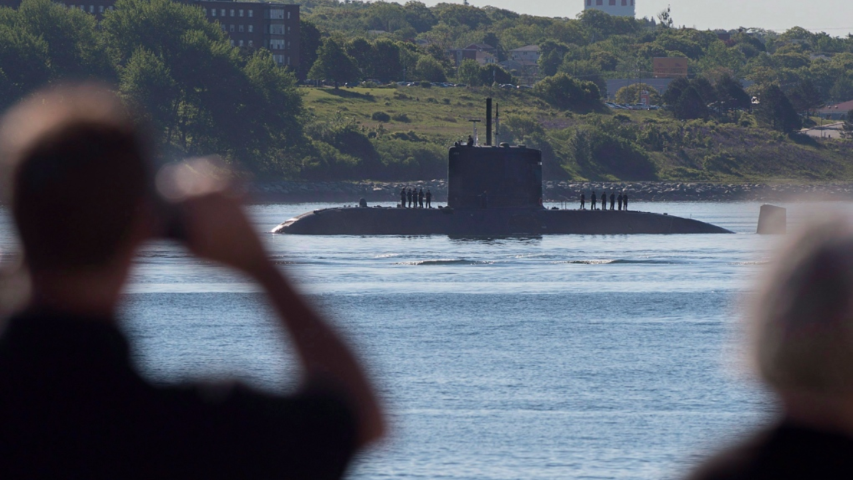
HMCS Windsor, a submarine from Canada's Victoria-class used for long-range patrols, arrived back at port in Halifax on Wednesday, June 20, 2018, following a 5-month mission in the Euro-Atlantic area.
After months of mounting pressure, senior government officials have informed CTV News that Canada is set to reveal its strategy this Thursday for meeting NATO’s requirement to allocate two percent of its GDP to defence. Canada is currently the only member of the alliance without a defined timeline to reach this target. According to NATO's most recent data, Canada is expected to allocate 1.37 percent of its GDP to defence spending this year. Among the 32 NATO countries, 23 are on track to meet or exceed the two percent benchmark by 2024.
Defence Minister Bill Blair and Prime Minister Justin Trudeau are currently in Washington for the NATO summit, commemorating the alliance's 75th anniversary. At the summit, Trudeau is expected to rally allies to maintain steadfastness in the face of global challenges.
Earlier this week, Blair addressed the Foreign Policy Security Forum, hinting at forthcoming details on Canada's defence expenditure plans. He assured that a comprehensive and verifiable plan would be shared with NATO allies to underscore Canada's commitment and responsibility in global security efforts.
Speaking at a panel during the NATO Public Forum, Blair reiterated Canada's determination to fulfill its pledge and potentially exceed it. He emphasized the importance of smart investments and hinted at collaborative efforts with Norway and Germany to enhance defence production capacities.
In April, the federal government introduced its long-awaited defence policy, projecting that military spending would rise to 1.76 percent of GDP by 2030. However, it did not specify a target to achieve the two percent threshold. The policy also outlined a significant investment plan of $8.1 billion over the next five years and $73 billion over the next two decades.
Canada has faced mounting criticism from NATO and its member states in the lead-up to the summit, urging Canada to ramp up its defence spending. Since the illegal invasion of Ukraine by Russia in 2022, NATO Secretary-General Jens Stoltenberg has stressed that the two percent target should be viewed as a minimum requirement rather than a maximum limit. In an interview with CTV Question Period, Stoltenberg highlighted the escalating global threats and emphasized the necessity for Canada to increase its contributions to defence and security.
This week, Canada has also been under fire from prominent U.S. politicians. Speaker of the House of Representatives Mike Johnson criticized Canada, accusing it of relying excessively on the security provided by the U.S. without adequately contributing to NATO defence spending. Senate Minority Leader Mitch McConnell echoed similar sentiments, calling for Canada to make substantial investments in defence capabilities to safeguard prosperity and security across NATO.
In May, a bipartisan group of 23 U.S. senators penned an open letter to Trudeau, expressing their disappointment over Canada's projected failure to meet its two percent commitment by the end of this decade.
Meanwhile, Canada has announced plans to acquire 12 new submarines to replace its aging fleet, a move aligned with its commitment to bolstering defence capabilities. The Department of National Defence is currently in discussions with potential manufacturers and partners to finalize the procurement process. Defence Minister Blair emphasized that these new submarines would play a pivotal role in protecting Canada's sovereignty amidst evolving global challenges and would significantly contribute to NATO's collective security efforts.















